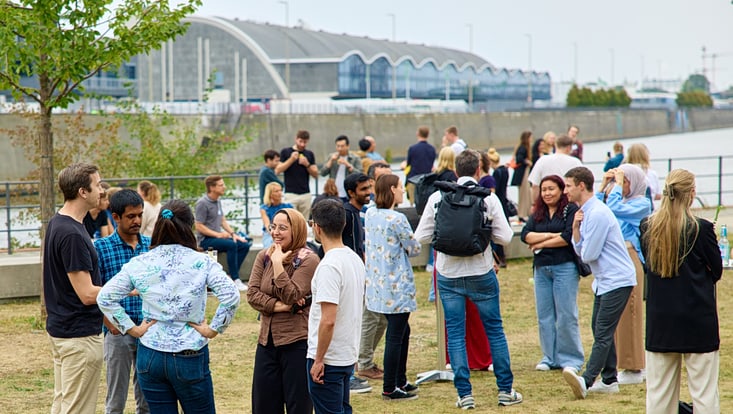Postdocs Abroad
30 September 2025
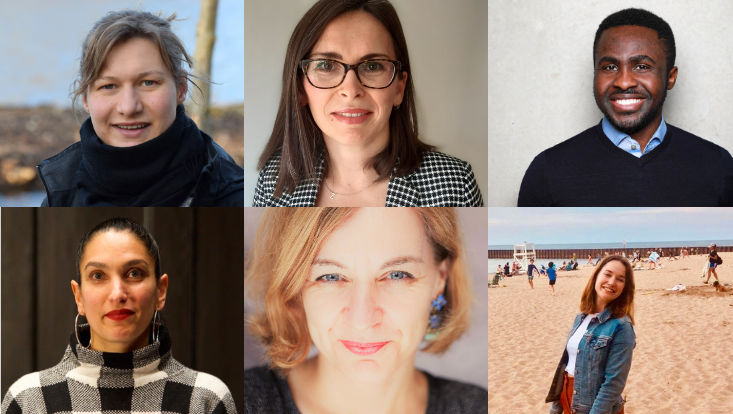
Photo: HRA
Our interview series shares the diverse international experiences of postdocs. Each article introduces a postdoc who talks about their international experiences. The interviews not only offer personal insights, but also practical tips and information for other researchers who are considering a stay abroad. The interviews originally appeared in our newsletter during the 2025 summer semester.
Anja Frank
The first person in our series is Dr. Anja Frank from the Institute for Geology at the University of Hamburg, who spent five years working in Copenhagen, Denmark – first as a PhD student, and then as a postdoc.
What was different in Copenhagen from what you were used to?
In my opinion, the Danish and German academic systems are very similar. However, Denmark is is already using many digital tools, which significantly simplifies many administrative tasks. In addition, the working environment in Denmark has a very flat hierarchy and, to me, it seemed easier for students to approach professors directly.
What personal and professional impulses did you take away from your time abroad?
My stay in Denmark taught me a lot about the country and its culture. Such cultural exchange is invaluable and I want to continue participating in it. Additionally, my stay taught me how difficult it can sometimes be to navigate challenges in a foreign country. Thus, I am now actively working to promote diversity in my working group and to support international researchers.
What is the connection between the object in the photo and your stay abroad?
My office at the National Museum was located in an old factory and, right next to it, was the old villa of its former owner with a beautiful garden. The picture shows a part of this garden, which is now used to grow different varieties of apples to preserve their diversity. Fun facts and stories like this made my postdoc very special. I worked in historical buildings, between interesting artefacts and research, consistently learning and discovering something new.
What tips would you give to other postdocs planning a stay abroad?
Networking, networking, networking. I’ve been told this over and over again and I'm tired of hearing it, but it is true that many doors open if you know the right person. The perfect example: I found my postdoc at the National Museum of Denmark through the help of my PhD supervisor.
Zrinka Kolakovic
Today, Dr. Zrinka Kolaković, postdoc at the Institute of Slavic Studies at the University of Hamburg, talks about her time as a DAAD PRIME postdoctoral fellow at the Department of Nordic Studies and Linguistics at the University of Copenhagen, Denmark.
What was different there from what you were used to?
The hierarchy is notably flat, and the chairs often don't have their own junior staff – PhD and postdoc positions primarily arise through scholarships and third-party funding. This leads to high competition, low approval rates and less time for research. However, there is a well-established third-party funding machinery at the departments and faculties, providing crucial support through advisors and workshops for for securing highly competitive project proposals.
What personal and professional impulses did you take away from your time abroad?
Various workshops were a game changer for me, for example on “programming without programming” or writing grant proposals aimed at both experts and broader audiences. Weekly writing lab sessions and monthly meetings with my supervisor ensured my project stayed on track. Additionally, I had the opportunity to familiarize myself with their linguistic lab, equipped with a soundproof phonetic studio, an observation room, and equipment like an eye tracker and EEG. On a personal note, my family and I learned a great deal from the Danes, who prioritize children’s rights and work-life balance. It is the output that matters most at work, not the time spent in the office.
What is the connection between the place in the photo and your stay abroad?
It shows part of the University of Copenhagen’s Southern Campus: on the left is Building 12, where the HUM DataLab is located, and where I polished my Polish at the Department of Cross-Cultural and Regional Studies. In front, across the small bridge, is Building 22 with the Department of Nordic Studies and Linguistics, and to the left is the University library. Above – the typical Danish weather: completely gray and cloudy, yet somehow charming.
What tips would you give to other postdocs planning a stay abroad?
The most important questions you should ask yourself are: “What can advance my career?” and “Where can I acquire these new skills?” Embrace out-of-the-box thinking and look for opportunities that fit your particular circumstances and eligibility criteria. Great starting points include the DFG Walter Benjamin Program, the Humboldt Foundation's Feodor Lynen Fellowship, the DAAD PRIME Fellowship and the MSCA Postdoctoral Fellowships. Ultimately, conducting a thorough cost-benefit analysis of the application requirements and success rates is essential for informed decision-making.
Further information on the funding program DAAD PRIME on the DAAD website
Adekunle Adedeji
Today, Dr. Adekunle Adedeji, postdoc in the Department of Social Work at HAW Hamburg and at the University Medical Center Hamburg-Eppendorf, talks about his time as a Feodor Lynen Research Fellow of the Alexander von Humboldt Foundation at the Faculty of Humanities at North-West University in Mafikeng, South Africa, where he spent two years implementing a research project.
What was different there from what you were used to?
I was struck by the openness of the people and the strong sense of social cohesion, especially during the COVID-19 pandemic. Communities showed remarkable creativity and solidarity in coping with the social restrictions. At the university, flat hierarchies encouraged open and collegial exchange, making collaboration both pleasant and enriching. At the same time, conducting my research presented unexpected challenges – particularly the decentralized and complex process of obtaining ethical approval, which turned out to be even more bureaucratic than in Germany. Despite this, the experience provided valuable new perspectives on academic cooperation and research structures.
What personal and professional impulses did you take away from your time abroad?
The experience had a lasting impact on my research focus, particularly in the areas of well-being and social participation. The intercultural encounters and collaboration with local partners strengthened my appreciation for context-sensitive approaches to research. On a personal level, I was deeply inspired by the resilience and vitality of the people I met. The insights I gained in South Africa continue to influence my work today, feeding into new projects and shaping long-term international collaborations.
What is the connection between the place in the photo and your stay abroad?
The photo shows the direction to Pilanesberg National Park. I traveled extensively across South Africa for data collection and met many remarkable people along the way—but I also took time to enjoy the country’s unique natural landscapes. The conversations and the spontaneous experiences left a lasting impression, both professionally and personally, and are closely tied to this place in my memory.
What tips would you give to other postdocs planning a stay abroad?
Start planning early, stay open-minded, and actively engage with local networks—that makes all the difference. For me, exchanging ideas with colleagues on the ground was especially valuable. The Alexander von Humboldt Foundation provided not only financial support but also a strong and lasting network that continues to enable meaningful collaborations well beyond the initial research stay.
Further information on the Feodor Lynen Research Fellowship
Nicole Gilberger
Today, Dr. Nicole Gilberger, postdoctoral fellow in infectious disease epidemiology at the Bernhard Nocht Institute for Tropical Medicine, reports on her first postdoc position after parental leave at McMaster University in Hamilton (Ontario), Canada.
What was different there from what you were used to?
I moved with my family and started my new job after altogether three years of parental leave. I clearly underestimated the move and the career change. Without friends, a social network or work colleagues, settling in was much more difficult than expected. In comparison, my previous stay abroad, when I lived in Melbourne, Australia, for two years before my PhD, was much less complicated. However, I didn't have children back then.
What personal and professional impulses did you take away from your time abroad?
This time provided valuable insights, but in an unexpected way. Professionally, I had to exercise patience: The project ultimately took eight years and the collaboration of several post-docs before publication. This had a negative impact on my CV. The lack of a supportive network made it clear to me how unrealistic it is to balance work and family responsibilities alone.
What is the connection between the object in the photo and your stay abroad?
The Canadian weather left a lasting impression. Although there are also beautiful seasons in northern Germany, I have never experienced such impressive fall and winter days. The ice-covered tree in the photo is one of the most beautiful natural phenomena I have ever seen.
What tips would you give to other postdocs planning a stay abroad?
I would recommend trying to negotiate something for your partner during job interviews. I had the impression that the move with the family was generally supported. Career planning with children is very individual - my first time as a mother and my return to work after parental leave had a rather negative impact on me. I would tell female postdocs: Plan your parental leave, think strategically. The world doesn't stand still and the pressure to perform is high. Don't underestimate what is expected of you (as a woman). It's easier with an “ally” as a partner. And: a guilty conscience was my constant companion in the first few years.
Jana Graul
Today, Dr. Jana Graul, research associate and deputy professor at the Department of Art History at the University of Hamburg, reports on her time as a postdoc in Italy, where she conducted research at the Max Planck Institutes in Florence and Rome and held fellowships in Florence and Venice.
What was different there from what you were used to?
I wasn’t used to the great importance attached to preparing food and eating together. I now really appreciate that and have learned to cook... People also don't take themselves too seriously, which makes everyday life a lot easier, as people are friendly with each other and deal with problems with a wink. When dealing with the authorities, I occasionally felt reminded of the famous A38 pass from “Asterix in Rome”, but digitalization has simplified many things.
What personal and professional impulses did you take away from your time in Italy?
I made wonderful friendships that continue to stay with me, as well as an international network, the value of which I only fully realized afterwards. The stays also shaped me in terms of methodology and content: Italian art was increasingly given a Mediterranean, European and global perspective at the MPIs at the time. I am now dealing with these transcultural contexts in my habilitation project.
What is the connection between the object in the photo and your stay abroad?
I chose François Boucher's Rape of Europa from 1732/34 because the painting is an ironic echo of the canonical Italian voyage of the time: Won over by the tameness of the bull into which Zeus has transformed himself to conquer her, Europa, clad in Italian colors, has already taken her place on his back. The French painter created it free of charge after his return, ironizing the credo that after a trip to Italy, ‘European’ success comes automatically to artistic talents.
What tips would you give to other postdocs planning a stay abroad?
For my field, i.e. art history, I can recommend the MPIs as research institutions: in addition to excellent libraries and photo libraries, they offer an international research environment that provides a wide range of impulses and methodological suggestions. They offer pre- and postdoctoral fellowships at regular intervals.
Further information on the offers for postdocs from the Max Planck Society
Eva Bleckmann
Today, Dr. Eva Bleckmann, postdoc at the Institute of Psychology at the University of Hamburg, reports on her stay at Northwestern University in Evanston, Illinois. After visiting a cooperation partner, she organized an interdisciplinary expert workshop and a symposium as part of a conference there.
What was different there from what you were used to?
The short duration of my stay required rigorous planning: I wanted to make the most of the time to move forward with my projects, but also to make new contacts locally. Both worked well in the two weeks of my stay. Despite the noticeable uncertainties in the US science system at the moment, I experienced an impressive openness and hospitality, which allowed me to meet many interesting people and talk about my research.
What personal and professional impulses did you take away from your time in the USA?
Although my stay was short, it was extremely rewarding. The expert workshop in particular was a fantastic experience: I gained many new perspectives and points of contact between my research and that of other researchers. Now, the workshop serves as the basis for long-term cooperation and networking. I am very much looking forward to actively participating in these activities.
What is the connection between the place in the photo and your stay abroad?
The picture shows part of the Northwestern University campus, which is located directly on Lake Michigan. It's very beautiful there in summer – walks along the lake and across the campus were an integral part of my stay every day.
What tips would you give to other postdocs planning a stay abroad?
For me personally, the conclusion is that even short stays can provide a welcome change of scenery and – with good preparation – provide new inspiration, important networking opportunities, and motivation boosts. There are many funding opportunities for such short research visits: for example, my stay was made possible by a Seed Funding Grant from UHH and Northwestern University and Internationalization Grant from UHH.
Funding opportunities within the UHH strategic university partnerships
Photos
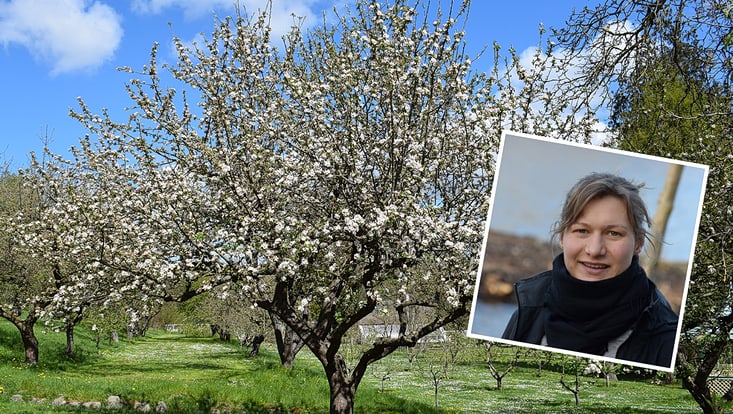
Photo: privat/Ryan Bond
Old apple trees next to the office
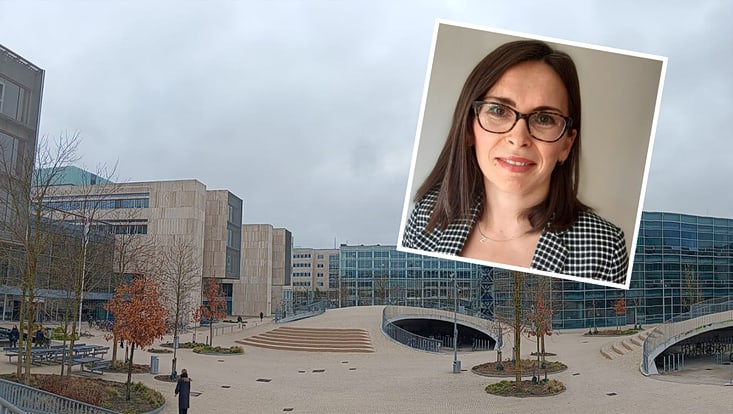
Photo: privat
University of Copenhagen’s Southern Campus with typical Danish weather
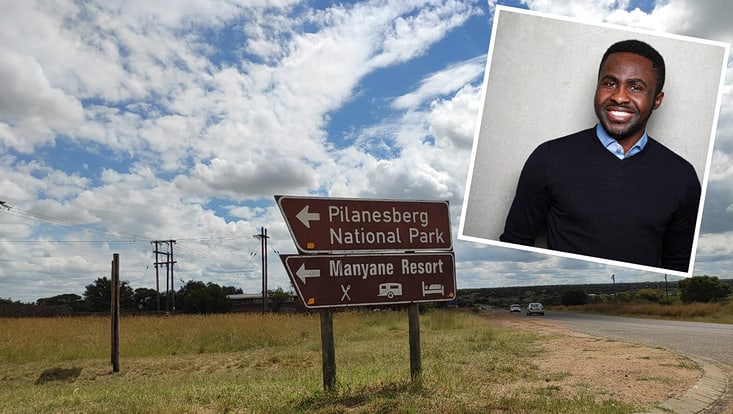
Photo: privat/HRA
Direction sign to Pilanesberg National Parc
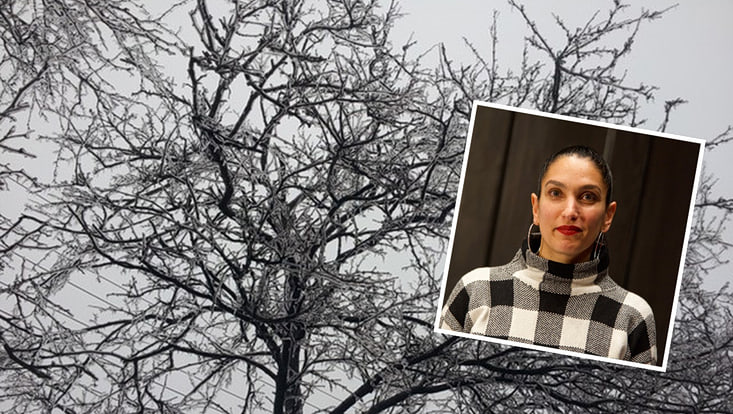
Photo: privat
ice-covered trees
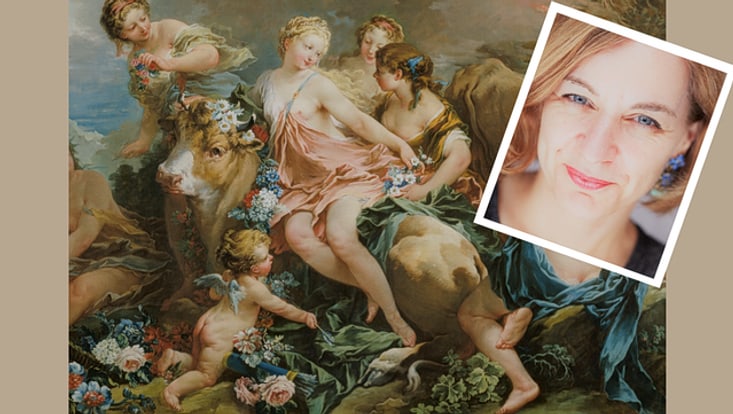
Photo: privat/Detail aus François Boucher, Der Raub der Europa
Detail from François Boucher, The Rape of Europa, circa 1732-34, oil on canvas, 230,8 x 273,5 cm, London, Wallace Collection CC-BY-NC-ND 40
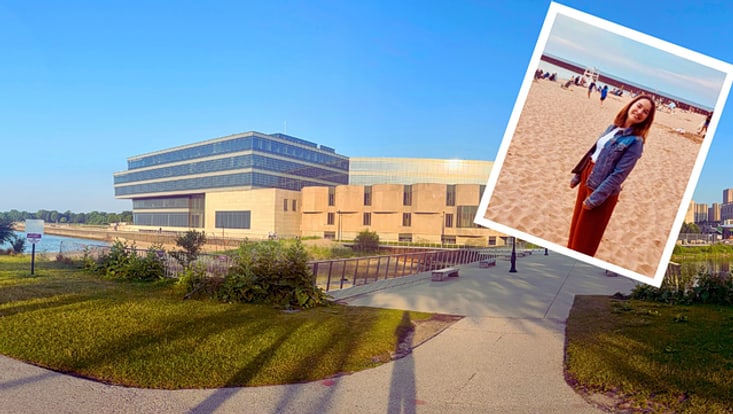
Photo: privat
Northwestern University campus located directly on Lake Michigan


